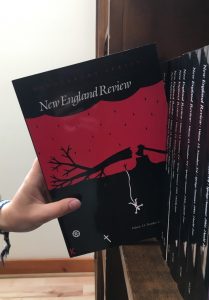
Former Associate Editor Devon Jersild introduces “Infinity” by Arnost Lustig, from NER 13.1 (1990)
Until this week, it had been nearly thirty years since I read Arnost Lustig’s story “Infinity,” but I’ve always remembered it—those three young men in a bunk at nightfall in Auschwitz, grumbling, sharing warmth and lice and fear and superstition, anxiously awaiting an event which isn’t named until it happens: the women in another barracks, singing. The Germans will shut the women up by siccing dogs on them or firing a machine gun into the barracks—in a few seconds or a few minutes, depending—and yet the women sing. “The heat from the chimneys gets on some people’s brains,” says one of the bunkmates. “They must all be mad, or they wouldn’t be asking for it.”
In jagged prose, with details never exaggerated and therefore more powerful, his awareness ranging over time and space, yet grounded in the excruciating present, the narrator evokes the women’s singing and the consciousness it liberates in him: and I couldn’t possibly say what that is, because it lives in the artistry of “Infinity.” If you read it, you’ll get a sense of the man Arnost Lustig must have been (he died in 2011) to have psychically survived his own internment in three prison camps, and to share with us the particulars, the despicable and the miraculous, the song and the ashes.
**
 Devon Jersild was Assistant Editor of NER from 1989 to 1990 and Associate Editor from 1990 to 1995. She co-edited, with T. R. Hummer, The Unfeigned Word: Fifteen Years of New England Review (1993). She is a writer, a clinical psychologist, and the author of Happy Hours: Alcohol in a Woman’s Life (HarperCollins, 2001).
Devon Jersild was Assistant Editor of NER from 1989 to 1990 and Associate Editor from 1990 to 1995. She co-edited, with T. R. Hummer, The Unfeigned Word: Fifteen Years of New England Review (1993). She is a writer, a clinical psychologist, and the author of Happy Hours: Alcohol in a Woman’s Life (HarperCollins, 2001).